Learn More
- RX1 X-CITE
- RX2 XLR8
- RX3 RECOVERY
- RX AALPHA
OUTWORK THE COMPETITION
The Power
X-Cite continues to carve out its place as one of the most effective pre-workout supplements on the market. Made from the most researched, most effective ingredients in sports nutrition, it’s no wonder why X-Cite is the choice for serious athletes.
The Science
Like everything we do at Athlean-X, our supplement facts panels contain a collection of the world’s best and brightest supplement ingredients. Each one is backed by research and science in sports medicine to ensure you’re getting the most effective dosages and the proper combinations to get real results.
The Facts
You asked and we answered with our most potent formulas and open labels so you know exactly which ingredients and how much of each you’re getting. Athlean-Rx contains no proprietary blends, and as always, no fillers, no substitutes and no harmful chemicals.
The Results
I’ve been working on this formula for well over a year, and I’ve promised to always deliver the same things that I recommend to my pro athletes and that I take myself. I’ve gotten a lot of comments on our YouTube channel about the gains I’ve made over the last few months. I can honestly say these formulas have had a major role in those results and they’re finally here so I can share them with you!
I take my training seriously, that’s why I take X-Cite before every workout.
ATHLEAN RX-1 X-CITE
ATHLEAN XCITE CONTAINS: 3200mg
CLINICAL STUDIES
Beta Alanine Increases intramuscular concentrations of carnosine thereby increasing strength, power, endurance and recovery, thereby increasing athletic performance and muscle mass.
- Increases fat loss and muscle growth
- Reduces post training session fatigue
ATHLEAN XCITE CONTAINS: 6g
CLINICAL STUDIES
One of the best benefits of L-Citrulline DL-Malate is enhanced ATP production. This is needed by every living cell in the body and equates to higher energy levels. This is even more important for muscles which are engaged in heavy training or otherwise working. Increased ATP production also leads to the ability to train harder and recover faster.
- Improves muscle endurance and aerobic performance
- Boosts energy
- Increases ATP production allowing for harder training and faster recovery
- Supports lean muscle mass gains
ATHLEAN XCITE CONTAINS: 2g (4g when taken with a stack)
CLINICAL STUDIES
Creatine hydrochloride's main benefit is helping to build muscle faster and easier. This is thought to be due to an increase in the production and supply of ATP to working muscle cells. This also provides more energy to the muscles, helping to avoid lactic acid build-up and allowing for longer and more intense workouts.
- Increases muscle strength and power
- Allows for faster and easier muscle growth
- Is better absorbed than Creatine Monohydrate and does not require a loading phase
- Reduces muscle damage and post workout soreness
ATHLEAN XCITE CONTAINS: 1.5g
CLINICAL STUDIES
One huge benefit of L-Tyrosine supplementation is that it can be useful for weight loss. It does this by improving some of the neurobiological disturbances typically caused by dietary restrictions. Medical research also indicates that L-Tyrosine supplementation can sharpen the memory, if taken on a regular basis. Tyrosine is able to protect the nerves from toxins and it is even able to cross the blood-brain barrier, which is one of the reasons why it is effective at raising the levels of key neurotransmitters. Another interesting l-tyrosine benefit is it helps the body adjust to situations of cold and fatigue.
- Supports weight loss
- Improves memory
- Regulates hormones
ATHLEAN XCITE CONTAINS: 1250mg
CLINICAL STUDIES
One of the most important benefits of Betaine is its ability to improve muscle strength and power during training sessions. Some studies have shown that it can improve endurance, increase the number of reps that can be done with a given weight, and improve power and force with every rep. Evidence also indicates that Betaine improves protein synthesis following training sessions.
- Improves muscle strength, power and endurance
- Increases protein synthesis following training sessions
- Increases growth hormone and insulin-like growth factor 1 production
- May help promote fat loss
ATHLEAN XCITE CONTAINS: 1g
CLINICAL STUDIES
Brand new studies suggest that Taurine is the most abundant amino acid in the body (above glutamine), particularly in the power generating type II fibers. Through supplementation it is possible to maintain peak stores of this important nutrient to enable more consistent force production without energy dropoff. Long term, taurine has been shown to be a cell volumizer that boosts internal muscle hydration…resulting in higher rates of muscle growth and function.
- Supports greater muscle growth and function
- Helps support cardiovascular function
- Helps temporarily restore mental alertness
- Assists in periods of increased mental and physical exertion
ATHLEAN XCITE CONTAINS: 1g
CLINICAL STUDIES
Choline is a precursor for several neurotransmitters that are important for brain function including muscle control, reflexes, memory and cognition. Research has also shown Choline to be beneficial for attention and focus.
- Improves attention
- Enhanced focus
ATHLEAN XCITE CONTAINS: 200mg
CLINICAL STUDIES
Caffeine is a widely used stimulant which is well studied and known to be safe in dosages of up to 500-600 mg. X-Cite provides the perfect blend of natural anhydrous caffeine and its herbal relative guarana, to produce unparalleled mental alertness and energy without the jitters or dangerous side effects of other popular pre-workout stimulants.
- Increases muscle endurance and strength
- Decreases muscle fatigue during workouts
- Boosts thermogenesis
- Improves concentration and short term memory
REFERENCES
Beta Alanine
-
Hoffman, J., Ratamess, N., Kang, J., Mangine, G., Faigenbaum, A., & Stout, J. (2006). Effect of creatine and ß-alanine supplementation on performance and endocrine responses in strength/power athletes. International Journal of Sport Nutrition and Exercise Metabolism, 16, 430-446.
-
Hoffman, J. R., Ratamess, N. A., Faigenbaum, A. D., Ross, R., Kang, J., Stout, J. R., & Wise, J. A. (2008). Short-durationBeta-alanine supplementation increases training volume and reduces subjective feelings of fatigue in college football players. Nutrition Research, 28(1), 31-35.
-
Kendrick IP, Harris RC, Kim HJ, Kim CK, Dang VH, Lam TQ, Bui TT, Smith M, and Wise JA. The effects of 10 weeks of resistance training combined with beta-alanine supplementation on whole body strength, force production, muscular endurance and body composition. Amino Acids 34: 547-554, 2008.
-
Stout, J. R., Graves, B. S., Smith, A. E., Hartman, M. J., Cramer, J. T., Beck, T. W., & Harris, R. C. (2008). The effect of beta-alanine supplementation on neuromuscular fatigue in elderly (55-92 years): a double-blind randomized study.Journal of the International Society of Sports Nutrition, 5(1), 1-6.
-
Zoeller, R. F., Stout, J. R., O'kroy, J. A., Torok, D. J., & Mielke, M. (2007). Effects of 28 days of beta-alanine and creatine monohydrate supplementation on aerobic power, ventilatory and lactate thresholds, and time to exhaustion.Amino Acids, 33(3), 505-510.
-
Hill, C. A., Harris, R. C., Kim, H. J., Harris, B. D., Sale, C., Boobis, L. H., ... & Wise, J. A. (2007). Influence of ?-alanine supplementation on skeletal muscle carnosine concentrations and high intensity cycling capacity. Amino Acids, 32(2), 225-233.
-
Smith, A. E., Walter, A. A., Graef, J. L., Kendall, K. L., Moon, J. R., Lockwood, C. M., ... & Stout, J. R. (2009). Effects of ?-alanine supplementation and high-intensity interval training on endurance performance and body composition in men; a double-blind trial. Journal of the International Society of Sports Nutrition, 6(1), 1-9.
-
Kern, B., & Robinson, T. (2009). Effects of beta-alanine supplementation on performance and body composition in collegiate wrestlers and football players. Journal of the International Society of Sports Nutrition, 6, 1-2.
-
Stout JR, Cramer JT, Zoeller RF, Torok D, Costa P, Hoffman JR, Harris RC, and O'Kroy J. Effects of beta-alanine supplementation on the onset of neuromuscular fatigue and ventilatory threshold in women. Amino Acids 32: 381-386, 2007.
-
Donovan, T., Ballam, T., Morton, J. P., & Close, G. L. (2012). B-alanine improves punch force and frequency in amateur boxers during a simulated contest. International Journal of Sport Nutrition and Exercise Metabolism, 22(5), 331-337.
-
Artioli GG, Gualano B, Smith A, Stout J, and Lancha AH, Jr.(201). Role of beta-alanine supplementation on muscle carnosine and exercise performance. Medicine and Science in Sports and Exercise. 42, 1162-1173.
-
Harris, R. C., Tallon, M. J., Dunnett, M., Boobis, L., Coakley, J., Kim, H. J., ... & Wise, J. A. (2006). The absorption of orally supplied B-alanine and its effect on muscle carnosine synthesis in human vastus lateralis. Amino acids, 30(3), 279-289.
L-Citrulline Malate
-
Performance and Relieves Muscle Soreness. The Journal of Strength & Conditioning Research 2010;24(5):1215-22 10.519/JSC.0b013e3181cb28e0.
-
Orozco-Gutierrez JJ, Castillo-Martinez L, Orea-Tejeda A, et al. Effect of L-arginine or L-citrulline oral supplementation on blood pressure and right ventricular function in heart failure patients with preserved ejection fraction. Cardiology journal 2010;17(6):612-8.
-
Sureda A, Cordova A, Ferrer M, Perez G, Tur J, Pons A. l-Citrulline-malate influence over branched chain amino acid utilization during exercise. European Journal of Applied Physiology 2010;110(2):341-51. doi: 10.1007/s00421-010-1509-4.
-
Effects of L-citrulline oral supplementation on polymorphonuclear neutrophils oxidative burst and nitric oxide production after exercise. Free Radical Research 2009;43(9):828-35. doi: doi:10.1080/10715760903071664.
Creatine HCL
-
Nelson, A. G., Arnall, D. A., Kokkonen, J., Day, R., & Evans, J. (2001). Muscle glycogen supercompensation is enhanced by prior creatine supplementation. Medicine and Science in Sports and Exercise, 33(7), 1096-1100.
-
Santos, R. V. T., Bassit, R. A., Caperuto, E. C., & Rosa, L. C. (2004). The effect of creatine supplementation upon inflammatory and muscle soreness markers after a 30km race. Life Sciences, 75(16), 1917-1924.
-
Lopez, R. M., Casa, D. J., McDermott, B. P., Ganio, M. S., Armstrong, L. E., & Maresh, C. M. (2009). Does creatine supplementation hinder exercise heat tolerance or hydration status? A systematic review with meta-analyses.Journal of Athletic Training, 44(2), 215.
-
Johnell, O., & Kanis, J. A. (2006). An estimate of the worldwide prevalence and disability associated with osteoporotic fractures. Osteoporosis International,17(12), 1726-1733.
-
Melton, L. J., Atkinson, E. J., O'Connor, M. K., O'Fallon, W. M., & Riggs, B. L. (1998). Bone density and fracture risk in men. Journal of Bone and Mineral Research, 13(12), 1915-1923.
-
Melton, J. L. (1995). Perspectives: how many women have osteoporosis now?. Journal of Bone and Mineral Research, 10(2), 175-177.
-
Center, J. R., Nguyen, T. V., Schneider, D., Sambrook, P. N., & Eisman, J. A. (1999). Mortality after all major types of osteoporotic fracture in men and women: an observational study. The Lancet, 353(9156), 878-882.
-
Chilibeck, P.D., Chrusch, M.J., Chad, K.E., Shawn Davison, K., & Burke, D.G. (2005). Creatine monohydrate and resistance training increase bone mineral content and density in older men. Journal of Nutrition Health and Aging, 9(5), 352-3.
-
Gualano, B., de Salles Painneli, V., Roschel, H., Artioli, G. G., Junior, M. N., Lucia de Sa Pinto, A., ... & Lancha, A. H. J. (2011). Creatine in type 2 diabetes: a randomized, double-blind, placebo-controlled trial. Medicine and Science in Sports and Exercise, 43(5), 770-778.
-
Gualano, B., Novaes, R. B., Artioli, G. G., Freire, T. O., Coelho, D. F., Scagliusi, F. B., ... & Lancha Jr, A. H. (2008). Effects of creatine supplementation on glucose tolerance and insulin sensitivity in sedentary healthy males undergoing aerobic training. Amino Acids, 34(2), 245-250.
-
Op't Eijnde, B., Ursø, B., Richter, E. A., Greenhaff, P. L., & Hespel, P. (2001). Effect of oral creatine supplementation on human muscle GLUT4 protein content after immobilization. Diabetes, 50(1), 18-23.
-
Johnston, A. P., Burke, D. G., MacNeil, L. G., & Candow, D. G. (2009). Effect of creatine supplementation during cast-induced immobilization on the preservation of muscle mass, strength, and endurance. The Journal of Strength & Conditioning Research, 23(1), 116-120.
-
Dechent, P., Pouwels, P. J. W., Wilken, B., Hanefeld, F., & Frahm, J. (1999). Increase of total creatine in human brain after oral supplementation of creatine-monohydrate. American Journal of Physiology-Regulatory, Integrative and Comparative Physiology, 277(3), R698-R704.
-
Watanabe, A., Kato, N., & Kato, T. (2002). Effects of creatine on mental fatigue and cerebral hemoglobin oxygenation. Neuroscience Research, 42(4), 279-285.
-
Rahimi, R. (2011). Creatine supplementation decreases oxidative DNA damage and lipid peroxidation induced by a single bout of resistance exercise. The Journal of Strength & Conditioning Research, 25(12), 3448-3455.
-
Sullivan, P. G., Geiger, J. D., Mattson, M. P., & Scheff, S. W. (2000). Dietary supplement creatine protects against traumatic brain injury. Annals of Neurology, 48(5), 723-729.
-
Scheff, S. W., & Dhillon, H. S. (2004). Creatine-enhanced diet alters levels of lactate and free fatty acids after experimental brain injury. Neurochemical Research, 29(2), 469-479.
-
Sakellaris, G., Kotsiou, M., Tamiolaki, M., Kalostos, G., Tsapaki, E., Spanaki, M., ... & Evangeliou, A. (2006). Prevention of complications related to traumatic brain injury in children and adolescents with creatine administration: an open label randomized pilot study. Journal of Trauma and Acute Care Surgery, 61(2), 322-329.
-
Sakellaris, G., Nasis, G., Kotsiou, M., Tamiolaki, M., Charissis, G., & Evangeliou, A. (2008). Prevention of traumatic headache, dizziness and fatigue with creatine administration. A pilot study. Acta Paediatrica, 97(1), 31-34.
-
Smith, R. N., Agharkar, A. S., & Gonzales, E. B. (2014). A review of creatine supplementation in age-related diseases: more than a supplement for athletes. F1000Research, 3.
L-Tyrosine
-
Wurtman, RJ, and Lewis MC. Exercise, plasma composition and neurotransmission. In: Advances in Nutrition and Top Sport, edited by Brouns F.. Basel: Karger, 1991, vol. 32, p. 94-109.
-
Romanowski, W, and Grabiec S. The role of serotonin in the mechanism of central fatigue. Acta Physiol Pol 25: 127-134, 1974.
-
Lieberman, HR, Corkin S, Spring BJ, Wurtman RJ, and Growden JH. The effects of dietary neurotransmitter precursors on human behavior. Am J Clin Nutr 42: 366-370, 1985.
-
Banderet, LE, and Lieberman HR. Treatment with tyrosine, a neurotransmitter precursor, reduces environmental stress in humans. Brain Res Bull 22: 759-762, 1989.
-
Gelenberg AJ, Gibson CJ, Wojcik JD. Neurotransmitter precursors for the treatment of depression. Psychopharmacol Bull 1982;18:7-18.
-
Meyer JS, Welch KMA, Deshmuckh VD, et al. Neurotransmitter precursor amino acids in the treatment of multi-infarct dementia and Alzheimer's disease. J Am Geriatr Soc 1977;7:289-98.
Betaine Anhydrous
- Lee E.C., et al. Ergogenic effects of betaine supplementation on strength and power performance. J Int Soc Sports Nutr. 2010 Jul 19; 7: 27.
- Trepanowski, J. F, et al. The effects of chronic betaine supplementation on exercise performance, skeletal muscle oxygen saturation and associated biochemical parameters in resistance trained men. J Strength Cond Res. 2011 Dec; 25(12): 3461-71
- Pryor, J. L., et al. Effect of betaine supplementation on cycling sprint performance. J Int Soc Sports Nutr. 2012 Apr 3; 9(1): 12.
- Apicella, J. M., et al. Betaine supplementation enhances anabolic endocrine and Akt signaling in response to acute bouts of exercise. Eur J Appl Physiol. 2013 Mar; 113(3): 793-802.
- Cholewa, J. M., et al. Effects of betaine on body composition, performance, and homocysteine thiolactone. J Int Soc Sports Nutr. 2013 Aug 22; 10(1): 39.
Taurine
- Azuma J, Takahisa K, Awata N, Ohta H, Hamaguchi H, Harada H, Takihara K, Hasegawa H, Yamagami R, Ishiyama T, Iwata H, Kishimoto S (1985) Therapeutic effect of taurine in congestive heart failure: a double-blind crossover trial. Clin Cardiol 8: 276–282
- Baba A, Lee E, Tatsuno T, Iwata H (1982) Cysteine sulfinic acid in the central nervous system: antagonistic effect of taurine on cysteine sulfinic acid-stimulated formation of cyclic AMP in guinea pig hippocampal slices. J Neurochem 38: 1280–1285
- Bousquet P, Feldman J, Bloch R, Schwartz J (1981) Tag antagonises the central cardiovascular effects of taurine. J Pharmacol Exp Ther 219: 213–218
- Chazov EI, Malchikova LS, Lipiva NV, Asafov GB, Smirnov VN (1974) Taurine and electrical activity of the heart. Circ Res 35: 11–21
- Costill DL, Palsky GP, Fink WJ (1978) Effects of caffeine ingestion on metabolism and exercise performance. Med Sci Sports 10: 155
- Franconi F, Stendardi MI, Failli P, Antonini G, Bennardini F, Matucci R, Manzini S, Giotti A (1983) Taurine antagonizes the alpha-adrenergic positive inotropic effect of phenylephrine. In:
- Kuriyama K, Huxtable RJ, Iwata H (eds) Sulfur amino acids: Biochemical and clinical aspects: 51–60
- Geiß K-R, Jester I, Askali F, Förster H, Hamm M, Böhmer D (1993) Auswirkungen fruktose- und glukosehaltiger Getränke auf die körperliche Leistungsfähigkeit bei 9 Triathleten. Dtsch Sportärztekongreß Paderborn (publication in preparation)
Geiß K-R, Nöcker J, Waag K-L, Queeney D (1991) Individual calorie calculation and sportspecific nutrient distribution in 100 high-performance athletes to increase performance. Int J Sports Med 12: 122 - Huxtable RJ, Bressler R (1973) Effect of taurine on a muscle intracellular membrane. Biochim Biophys Acta 323: 573–583
Huxtable RJ (1992) Physiological actions of taurine. Physiological Rev 72 1: 128 - IBL (1993) Radioimmunoassays zur quantitativen Bestimmung der Katecholamine Noradrenalin und Adrenalin in Plasma und Urin. dbm bulletin: 1–20
- Inoue A, Takahashi H, Lee L, Iyoda I, Sasaki S, Ijichi H (1985) Centrally induced vasodepressor and sympathetic nerve responses to taurine. Jpn Circ J 49: 1180–1184
- Jacobs DS (ed) (1988) Laboratory test handbook. Laxi-Comp/Mosby, Cleveland, p 139
- Livesey JH, Hodgkinson SC, Roud HR, Donald RA (1980) hGH-analysing methods. Clin Biochem 13: 151
- Mal'Chikova LS, Elizarova EP (1981) Taurine and cAMP content in the heart. Kardiologiya 21: 85–89
- Mal'Chikova LS, Speranskaia NV, Elizarova EP (1979) Effect of taurine on the cAMP and cGMP content in the rat heart in stress. Byull Eksp Biol Med 87: 134–137
Muramatsu M, Kakita K, Kuriyama K (1978) Amodulating tole of taurine on release of acetyl choline and norapinephrine from neuronal tissue. Jpn J Pharmacol 28: 259–268 - Ono M, Watanabe M, Minato K (1987) Effects of taurine on the metabolism under physical exercise. Sulfur Amino Acids 10: 183–186
- Pasantes-Morales H (1982) Taurine-calcium interactions in frog rod outer segments; taurine effects on an ATP-dependent calcium translocation process. Vision Res 22: 1487–1493
- Pasantes-Morales H, Martin DL, Ordonez A (1982) Taurine activation of a bicarbonatcdependent, ATP-supported calcium uptake in frog rod outer segments. Neurochem Res 7: 317–328
- Sherman WM, Brodowicz GR, Wright DA, Allen WK, Simonsen J, Dernbach A (1989) Effects of 4th preexercise carbohydrate feedings on cycling performance. Med Sci Sports Exer 21: 598–604
- Trout DL, Estes EH, Friedberg SJ (1969) Microdetermination of long chain fatty acids in plasma and tissues. J Lipid Res 1: 199
Choline Bitartrate
- Wurtman RJ. Effects of dietary amino acids, carbohydrates and choline neurotransmitter synthesis. Mt Sinai J Med 1988;55(1):75-86.
- Wurtman RJ, Hefti F. Melamed E. Precursor control of neurotransmitter synthesis. Pharmacol Rev 1981 ;32(4):315-35.
- Maire, J-C, Wurtman RJ. Effects of electrical stimulation and choline availability on release and contents of acetylcholine and choline in superfused slices from rat striatum. J Physiol Paris 1985;80:189-95.
- Blusztajn JK, Wurtman RJ. Choline and cholinergic neurons. Science 1983;221:614-20.
- Bierkamper GG, Goldberg AM. Release of acetylcholine from the vascular perfused rat phrenic nerve hemidiaphragm. Brain Res 1980;202:234-7.
- Dieterich HA, Lindmar R. Loffelholz K. The role of choline in the release of acetylcholine in isolated hearts. Arch Pharmacol 1978;301 :207-15.
- Linden DC, Newton MW, Grinnell AD, Jenden DJ. Rapid decline in acetylcholine release and content of rat extensor digitorum longus muscle after denervation. Exp Neurol 1983;81:613-26.
- Sandage BW, Sabounjian LA, White R. Wurtman RJ. Choline citrate may enhance athletic performance. Physiologist 1992;35:236a.
- Von Allworden HN, Horn S. Kahl J. Feldheim W. The influence of lecithin on plasma choline concentrations in biathletes and adolescent runners during exercise. Eur J Appl Physiol 1983;67:87-91.
- Conlay LA, Wurtman RJ, Blusztajn JK, Covielia IJ, Maher TJ, Evoniuk GE. Decreased plasma choline concentrations in marathon runners (letter). NEM 1986;175:892.
- Spector SA, Jackman MR, Sabounjian LA, Sakas C, Landers DM, Willis VVT. Effect of choline supplementation on fatigue in trained cyclists. Med Sci Sports Exerc 1995;27(5):669-73.
Caffeine Anhydrous & Guarana
- Duncan, M. J., Smith, M., Cook, K., & James, R. S. (2012). The acute effect of a caffeine-containing energy drink on mood state, readiness to invest effort, and resistance exercise to failure. The Journal of Strength & Conditioning Research, 26(10), 2858-2865.
- Trexler, E. T., Smith-Ryan, A. E., Roelofs, E. J., Hirsch, K. R., & Mock, M. G. (2015). Effects of coffee and caffeine anhydrous on strength and sprint performance. European Journal of Sport Science, 1-9.
- Beck, T. W., Housh, T. J., Schmidt, R. J., Johnson, G. O., Housh, D. J., Coburn, J. W., & Malek, M. H. (2006). The acute effects of a caffeine-containing supplement on strength, muscular endurance, and anaerobic capabilities. The Journal of Strength & Conditioning Research, 20(3), 506-510.
- Sökmen, B., Armstrong, L. E., Kraemer, W. J., Casa, D. J., Dias, J. C., Judelson, D. A., & Maresh, C. M. (2008). Caffeine use in sports: considerations for the athlete. The Journal of Strength & Conditioning Research, 22(3), 978-986.
- Church, D. D., Hoffman, J. R., LaMonica, M. B., Riffe, J. J., Hoffman, M. W., Baker, K. M., ... & Stout, J. R. (2015). The effect of an acute ingestion of Turkish coffee on reaction time and time trial performance. Journal of the International Society of Sports Nutrition, 12(1), 1-11.
- Hurley, C. F., Hatfield, D. L., & Riebe, D. A. (2013). The effect of caffeine ingestion on delayed onset muscle soreness. The Journal of Strength & Conditioning Research, 27(11), 3101-3109.
- Pedersen, D. J., Lessard, S. J., Coffey, V. G., Churchley, E. G., Wootton, A. M., Watt, M. J., & Hawley, J. A. (2008). High rates of muscle glycogen resynthesis after exhaustive exercise when carbohydrate is coingested with caffeine. Journal of Applied Physiology, 105(1), 7-13.
- Gahreman, D., Wang, R., Boutcher, Y., & Boutcher, S. (2015). Green Tea, Intermittent Sprinting Exercise, and Fat Oxidation. Nutrients, 7(7), 5646-5663.
- Hodgson, A. B., Randell, R. K., & Jeukendrup, A. E. (2013). The effect of green tea extract on fat oxidation at rest and during exercise: evidence of efficacy and proposed mechanisms. Advances in Nutrition: An International Review Journal, 4(2), 129-140.
- Vaughan, R. A., Conn, C. A., & Mermier, C. M. (2014). Effects of commercially available dietary supplements on resting energy expenditure: a brief report. ISRN nutrition, 2014.
- Goldstein, E. R., Ziegenfuss, T., Kalman, D., Kreider, R., Campbell, B., Wilborn, C., ... & Wildman, R. (2010). International society of sports nutrition position stand: caffeine and performance. Journal of the International Society of Sports Nutrition, 7(1), 5.
- Cherry Lemon Ice
- Fresh Squeezed Orange
- Country Pink Lemonade
- Jolly Watermelon Pucker
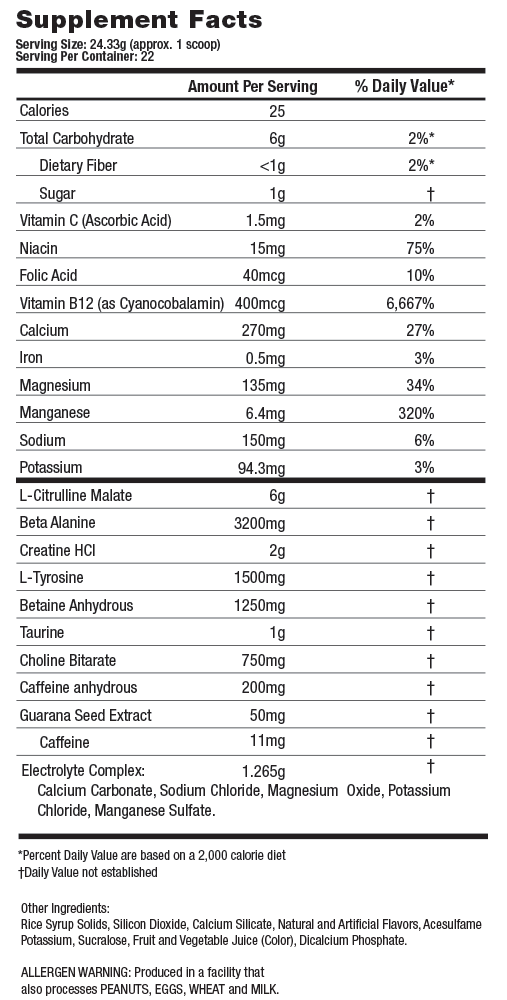

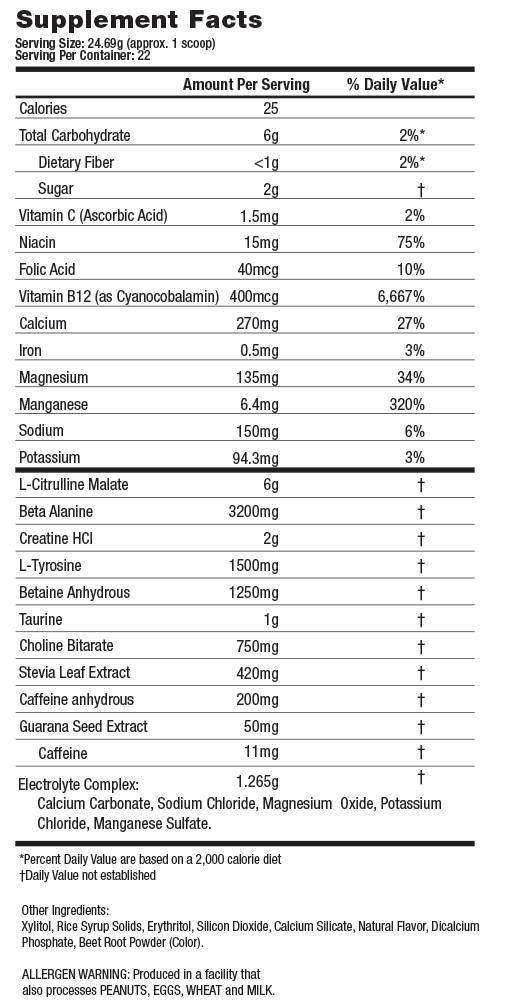
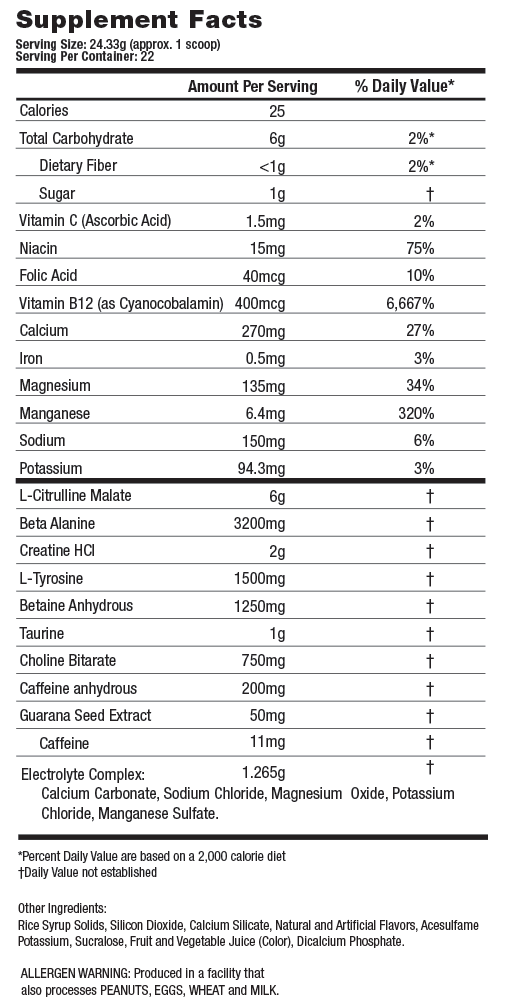
OUTGROW THE COMPETITION
The Power
Since it exploded onto the market, X-LR8 has continued to earn praise from the thousands of members of Team Athlean who have experienced its power. Nothing fancy, just the stuff you need.
The Science
Athlean-Rx XLR8 contains an impressive 30g of protein per serving! If you’re unsure whether or not you’re getting enough quality protein in your diet, the truth is, you’re probably not. Conservative recommendations for an athlete are around 1.5g of Protein per pound of body weight. So if you weigh 180lbs you’re looking at over 250g a day, every single day! If you have a busy schedule that can be a daunting task.
The Facts
You asked and we answered with our most potent formulas and open labels so you know exactly which ingredients and how much of each you’re getting. Athlean-Rx contains no proprietary blends, and as always, no fillers, no substitutes and no harmful chemicals.
The Results
We have tens of thousands of members of team athlean who have gotten great results from incorporating XLR8 into their nutrition plan.
I use XLR8 as a post workout supplement or a meal replacement.
ATHLEAN RX-2 XLR8
ATHLEAN XLR8 CONTAINS: 2g (4g when taken with Stack)
CLINICAL STUDIES
Kre-Alkalyn is a buffered form of creatine that is processed at a higher PH level than the more acidic creatine monohydrate form. The more acidic the creatine, the more likely it is to chemically be converted into creatinine…the unusable byproduct. The decreased acidity of Kre-Alkalyn allows more of the creatine to be absorbed by the muscles and allows for smaller effective dosages with NO NEED FOR LOADING! This delivery is extremely well tolerated by the body with far less “creatine bloat” experienced and does not have to be cycled allowing you to get the uninterrupted benefits of creatine.
- Increases muscle strength and power
- Allows for faster and easier muscle growth
- Is better absorbed than Creatine Monohydrate and does not require a loading phase
- Reduces muscle damage and post workout soreness
- Reduces post training session fatigue
ATHLEAN XLR8 CONTAINS: 1250mg
CLINICAL STUDIES
One of the most important benefits of Betaine is its ability to improve muscle strength and power during training sessions. Some studies have shown that it can improve endurance, increase the number of reps that can be done with a given weight, and improve power and force with every rep. Evidence also indicates that Betaine improves protein synthesis following training sessions.
- Improves muscle strength, power and endurance
- Increases protein synthesis following training sessions
- Increases growth hormone and insulin-like growth factor 1 production
- May help promote fat loss
REFERENCES
Kre-Alkalyn
- Nutritional supplement for increased muscle size and strength for body builders
- Effects of creatine monohydrate and polyethylene glycosylated creatine supplementation on muscular strength, endurance, and power output
- Food supplement for increasing lean mass and strength
- Effects of Creatine Monohydrate vs. Creatine Hydrochloride on Muscle EndurancePerformance
- Creatine HCl and Creatine Monohydrate Improve Strength but Only Creatine HCl Induced Changes on Body Composition in Recreational Weightlifters
- Creatine supplementation increases glycogen storage but not GLUT-4 expression in human skeletal muscle
- Creatine supplementation with specific view to exercise/sports performance: an update
- The effect of an alkaline buffered creatine (Kre-Alkalyn®), on cell membrane behavior, protein synthesis, and cisplatin-mediated cellular toxicity
- CREATINE: WHY USE IT? SCIENTIFIC SUPPORT TO BACK ITS BENEFITS
- Effect of creatine supplementation on body composition and performance: a meta-analysis.
- Effect of creatine and beta-alanine supplementation on performance and endocrine responses in strength/power athletes.
- Effects of two and five days of creatine loading on muscular strength and anaerobic power in trained athletes.
- Effects of creatine supplementation and resistance training on muscle strength and weightlifting performance.
- Effect of creatine phosphate supplementation on anaerobic working capacity and body weight after two and six days of loading in men and women.
- Combined creatine and sodium bicarbonate supplementation enhances interval swimming.
- Effect of two and five days of creatine loading on anaerobic working capacity in women.
- Effects of high dose oral creatine supplementation on anaerobic capacity of elite wrestlers.
- Effects of four weeks of high-intensity interval training and creatine supplementation on critical power and anaerobic working capacity in college-aged men.
- The effects of creatine loading and gender on anaerobic running capacity.
- Effect of short-term creatine supplementation on markers of skeletal muscle damage after strenuous contractile activity.
- The effect of creatine supplementation upon inflammatory and muscle soreness markers after a 30km race.
- Muscle glycogen supercompensation is enhanced by prior creatine supplementation.
- Creatine supplementation affects muscle creatine during energy restriction.
- Effects of creatine monohydrate and polyethylene glycosylated creatine supplementation on muscular strength, endurance, and power output. http://www.ncbi.nlm.nih.gov/pubmed/19387397
Betaine Anhydrous
-
Lee E.C., et al. Ergogenic effects of betaine supplementation on strength and power performance. J Int Soc Sports Nutr. 2010 Jul 19; 7: 27.
-
Trepanowski, J. F, et al. The effects of chronic betaine supplementation on exercise performance, skeletal muscle oxygen saturation and associated biochemical parameters in resistance trained men. J Strength Cond Res. 2011 Dec; 25(12): 3461-71
-
Pryor, J. L., et al. Effect of betaine supplementation on cycling sprint performance. J Int Soc Sports Nutr. 2012 Apr 3; 9(1): 12.
-
Apicella, J. M., et al. Betaine supplementation enhances anabolic endocrine and Akt signaling in response to acute bouts of exercise. Eur J Appl Physiol. 2013 Mar; 113(3): 793-802.
-
Cholewa, J. M., et al. Effects of betaine on body composition, performance, and homocysteine thiolactone. J Int Soc Sports Nutr. 2013 Aug 22; 10(1): 39.
- Chocolate Fudge Brownie
- Strawberry Banana Split
- French Vanilla Bean
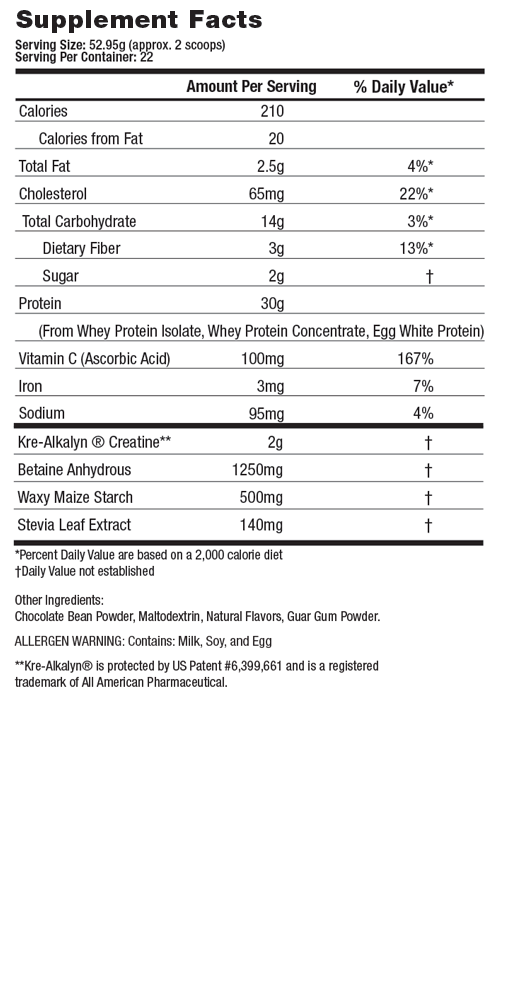


OUT RECOVER THE COMPETITION
The Power
Recovery is more than just a buzzword. It is a recognized stage of the muscle building process. The fact is, if you aren’t taking recovery seriously, you are never going to reach your full potential. Recovery is so important that several of the leading sports organizations in the world have created panels of specialists to make sure their million dollar athletes are recovering properly and adequately, and Athlean-Rx ReconstruXion has been a part of that conversation.
The Science
6g of Leucine, a whopping 10g of Glutamine, 1.25g of Betaine… These are just the kick off points for this powerhouse of a formula. As always, we put the science in everything we do, and each and every ingredient is thoroughly researched and backed by studies to prove its efficacy as a sports recovery supplement.
The Facts
You asked and we answered with our most potent formulas and open labels so you know exactly which ingredients and how much of each you’re getting. Athlean-Rx contains no proprietary blends, and as always, no fillers, no substitutes and no harmful chemicals.
The Results
ReconstruXion is the go to recovery formula for some of the top teams in pro sports. It’s been so effective with our athletes that we have several reports of it preventing delayed onset muscle soreness (DOMS) after particularly intense workouts. While these reports are anecdotal at this stage I can personally attest to RX3’s effectiveness in helping me battle DOMS.
I use ReconstruXion daily as a recovery aid and to assist in blunting the effects of DOMS after training.
ATHLEAN RX-3 ReconstruXion
ATHLEAN ReconstruXion CONTAINS: 2g
CLINICAL STUDIES
Research suggestions that L-Carnitine L-Tartrate improves muscle recovery and repair times. This is probably due to a boost in nitric oxide (NO) production, which improves blood flow and oxygen consumption in the muscles. LCLT also increases androgen receptors in the muscle cells, which means more testosterone is recruited to build muscle.
- Improves muscle recovery and repair between training sessions (probably due to a boost in Nitric Oxide and an increase in muscle oxygen consumption)
- Increases androgen receptors in muscle cells, thereby recruiting more testosterone to build muscle
- Improves insulin sensitivity
ATHLEAN ReconstruXion CONTAINS: 6g
CLINICAL STUDIES
Considered one of the most anabolic of all the individual amino acids, L-Leucine is considered to be the main activator of protein synthesis via its effects on the mTOR pathway. What makes it especially vital (and often in deficient supply) is that it is an essential amino acid, which means that the body doesn’t produce it naturally. The only way for you to get this key amino acid in your system is through diet and or supplementation. Throw in its additional researched ability to prevent the breakdown of muscle tissue after intense training, and your ability to tip the balance of muscle growth in your favor just grew by leaps and bounds with ReconstruXion.
- Reduces muscle breakdown caused by intense exercise or dieting
- Stimulates protein synthesis, which increases the effectiveness of training and speeds recovery time between training sessions
- May increase metabolic rate
ATHLEAN ReconstruXion CONTAINS: 10g
CLINICAL STUDIES
L-Glutamine is most commonly used for improving healing time following injuries or surgery. It can help speed recovery time between training sessions due to an increase in nitrogen levels in the muscle cells which assists in protein synthesis. L-Glutamine is also recognized for boosting the immune system, increasing energy levels and helping to regulate blood sugar levels.
- Reduces healing time after injuries or surgery
- Increases nitrogen levels in the muscle cells to assist in protein synthesis, which increases the effectiveness of training and speeds recovery time between training sessions
- Boosts the immune system, which can be compromised by intense training
- Increases energy levels and helps maintain steady blood sugar levels
ATHLEAN ReconstruXion CONTAINS: 1250mg
CLINICAL STUDIES
One of the most important benefits of Betaine is its ability to improve muscle strength and power during training sessions. Some studies have shown that it can improve endurance, increase the number of reps that can be done with a given weight, and improve power and force with every rep. Evidence also indicates that Betaine improves protein synthesis following training sessions.
- Improves muscle strength, power and endurance
- Increases protein synthesis following training sessions
- Increases growth hormone and insulin-like growth factor 1 production
- May help promote fat loss
ATHLEAN ReconstruXion CONTAINS: 200mg
CLINICAL STUDIES
L-Theanine is recognized for improving cognitive and mental processing, as well as focus, attention, memory, alertness and mood. It can also help improve sleep quality, reduce stress and help keep the body in a state of relaxation. It also helps improve immune system function, which can become compromised with heavy training.
- Reduces the effects of stress
- Increases serotonin and dopamine
- Improves sleep quality
- Improves focus, attention, memory, alertness and mood
- Improves immune system function
- The most effective dose for Theanine is from 100-250g per day
REFERENCES
L-Carnitine L-Tartrate
-
Kong, W., Chen, S., et al. Effects of Taurine on Rat Behaviors in Three Anxiety Models. Pharmacology, Biochemistry, and Behavior. February 2006. 83(2), 271-276.
-
El Idrissi, A., Goukarrou, L., et al. Effects of Taurine on Anxiety-Like and Locomotor Behavior of Mice. Advances in Experimental Medicines and Biology. 2009. 643, 207-215.
-
Sung, M., Chang, K. Dietary Taurine and Nutrients Intake and Anthropometric and Body Composition Data by Abdominal Obesity in Korean Male College Student. Advances in Experimental Medicines and Biology. 2009. 643, 429-435.
-
Du., H., You, J., et al. Antiobesity and Hypolipidemic Effects of Lotus Leaf Hot Water Extract with Taurine Supplementation in Rats Fed a High Fat Diet. Journal of Biomedical Sciences. 2010. 17 Suppl 1, S42.
-
Solon, C., Franci, D., et al. Taurine Enhances the Anorexigenic Effects of Insulin in the Hypothalamus of Rats. Amino acids. 2011. Published Ahead of Print.
-
Arruda, A., Milanski, M., et al. Low-Grade Hypothalamic Inflammation Leads to Defective Thermogenesis, Insulin Resistance and Impaired Insulin Secretion. Endocrinology. April 2011. 152(4), 1314-1320.
-
Pina-Zentella, G., de la Rosa, C., et al. Taurine in Adipocytes, Prevents Insulin-Mediated H2O Generation and Activates Pka and Lipolysis. Amino acids. May 2011. Published ahead of Print.
-
Tito, T., Shaffer, S., et al. The Potential Usefulness of Taurine on Diabetes and its Complications. Amino acids. March 2011. Published Ahead of Print.
-
Ricci, L., Valoti, M., et al. Taurine-Like GABA Aminotransferase Inhibitors Prevent Rabbit Brain Slices Against Oxygen-Glucose Deprivation Induced Damage. Amino Acids. June 2011. Published Ahead of Print.
-
Genitle, C., Nivala, A., et al. Experimental Evidence of Therapeutic Potential of Taurine in the Treatment of Nonalcoholic Fatty Liver Disease. American Journal of Physiology. December 2011. Published ahead of Print.
-
Madani, Z., Louchami, K., et al. Dietary Sardine Protein Lowers Insulin Resistance, Leptin and TNF and Beneficially affects adipose Tissue Oxidative Stress in Rats with Fructose-Induced Metabolic Syndrome. International Journal of Molecular Medicine. February 2012. 29(2), 311-318.
-
Yatabe, Y., Miyakawa, S., et al. Effects of Taurine Administration on Exercise. Advances in Experimental Medicines and Biology. 2009. 643, 245-255.
-
Rutherford, J., Spriet, L., et al. The Effect of Acute Taurine Ingestion on Endurance Performance and Metabolism in Well-Trained Cyclists. International Journal of Sport Nutrition and Exercise Metabolism. August 2010. 20(4), 322-329.
-
Hamilton, E., Berg, HJ., et al. The Effect of Taurine Depletion on the Contractile Properties and Fatigue in Fast-Twitch Skeletal Muscle of the Mouse. Amino acids. October 2001. 31(3), 273-280.
-
Silva, L., Silveira, P., et al. Taurine Supplementation Decreases Oxidative Stress in Skeletal Muscle After Eccentric Exercise. Cell Biochemistry and Function. January 2011. 29(1), 43-49.
-
Beyranvand, M., Khalafi, M., et al. Effect of Taurine Supplementation on Exercise Capacity of Patients with Heart Failure. Journal of Cardiology. May 2011. 57(3), 333-335.
-
Rahman, M., Park, H., et al. Taurine Prevents Hypertension and Increases Exercise Capacity in Rats with Fructose-Induced Hypertension. American Journal of Hypertension. May 2011. 24(5), 574-580.
L-Leucine
-
The Influence of Oral L-Glutamine Supplementation on Muscle Strength Recovery and Soreness Following Unilateral Knee Extension Eccentric Exercise
-
A Multi-Ingredient Containing Carbohydrate, Proteins L-Glutamine and L-Carnitine Attenuates Fatigue Perception with No Effect on Performance, Muscle Damage or Immunity in Soccer Players
-
http://journals.plos.org/plosone/article?id=10.1371/journal.pone.0125188
-
Carvalho-Peixoto J, Alves RC, Cameron LC Glutamine and carbohydrate supplements reduce ammonemia increase during endurance field exercise . Appl Physiol Nutr Metab. (2007)
-
MacLean DA, Graham TE, Saltin B. Branched-chain amino acids augment ammonia metabolism while attenuating protein breakdown during exercise. Am J Physiol 1994;267:E1010-22.
-
Mittleman KD, Ricci MR, Bailey SP. Branched-chain amino acids prolong exercise during heat stress in men and women. Med Sci Sports Exerc 1998;30:83-91.
-
Blomstrand E, Hassmen P, Ekblom B, et al. Administration of branched-chain amino acids during sustained exercise-effects on performance and on plasma concentration of some amino acids. Eur J Appl Physiol 1991;63:83-8.
-
Plaitakis A, Smith J, Mandeli J, et al. Pilot trial of branched-chain amino acids in amyotrophic lateral sclerosis. Lancet 1988;1:1015-8.
-
Soreide E, Skeie B, Kirvela O, et al. Branched-chain amino acid in chronic renal failure patients: respiratory and sleep effects. Kidney Int 1991;40:539-43.
L-Glutamine
-
Supplementation "Bodybuilding For You", 2002
-
Glutamine FAQ's "The Ministry of Fitness", 2000
-
Glutamine Q&A "Pas-Fitness", New Castle, DE, 2002
-
"The Healing Nutrients Within", E R Braverman & C C Pfeiffer, Keats, 1987.
-
Elia M, Lunn PG. The use of glutamine in the treatment of gastrointestinal disorders in man. Nutrition, 13;7-8:743-747 1997.
-
Keast D, et al. depression of plasma glutamine concentration after exercise stress and its possible influence on the immune system. Med J Aust, 162;1:15-18 1995.
- Quest Health Library, "l-glutamine", 2000.
Betaine Anhydrous
-
Lee E.C., et al. Ergogenic effects of betaine supplementation on strength and power performance. J Int Soc Sports Nutr. 2010 Jul 19; 7: 27.
-
Trepanowski, J. F, et al. The effects of chronic betaine supplementation on exercise performance, skeletal muscle oxygen saturation and associated biochemical parameters in resistance trained men. J Strength Cond Res. 2011 Dec; 25(12): 3461-71
-
Pryor, J. L., et al. Effect of betaine supplementation on cycling sprint performance. J Int Soc Sports Nutr. 2012 Apr 3; 9(1): 12.
-
Apicella, J. M., et al. Betaine supplementation enhances anabolic endocrine and Akt signaling in response to acute bouts of exercise. Eur J Appl Physiol. 2013 Mar; 113(3): 793-802.
-
Cholewa, J. M., et al. Effects of betaine on body composition, performance, and homocysteine thiolactone. J Int Soc Sports Nutr. 2013 Aug 22; 10(1): 39.
L-Theanine
-
Anti-stress effect of theanine on students during pharmacy practice: Positive correlation among salivary α-amylase activity, trait anxiety and subjective stress
-
Psychological effects of dietary components of tea: caffeine and L-theanine
-
The effects of L-theanine, caffeine and their combination on cognition and mood
-
Effects of L-theanine or caffeine intake on changes in blood pressure under physical and psychological stresses
-
Method of treating extreme physical or mental stress using L-theanine to obtain accelerated regeneration
-
L-theanine and caffeine in combination affect human cognition as evidenced by oscillatory alpha-band activity and attention task performance
-
L-Theanine promotes nitric oxide production in endothelial cells through eNOS phosphorylation
-
L-theanine, a natural constituent in tea, and its effect on mental state.
-
Assessing the effects of caffeine and theanine on the maintenance of vigilance during a sustained attention task.
-
L-theanine and caffeine improve task switching but not intersensory attention or subjective alertness.
-
The effects of L-theanine on alpha-band oscillatory brain activity during a visuo-spatial attention task.
-
L-Theanine extends lifespan of adult Caenorhabditis elegans
-
Eschenauer, Gregory, and Burgunda V. Sweet. "Pharmacology And Therapeutic Uses Of Theanine." American Journal of Health-System Pharmacy 63.1 (2006): 26. Academic Search
-
Elite. Web. 12 Sept. 2012
-
Improving mental regeneration after physical exercise
-
Herbal Extracts and Phytochemicals: Plant Secondary Metabolites and the Enhancement of Human Brain Function
-
http://www.smarternootropics.com/table-of-contents/l-theanine/
- Twisted Lemon Lime
- Pina Colada
- Tangy Tangerine Twist
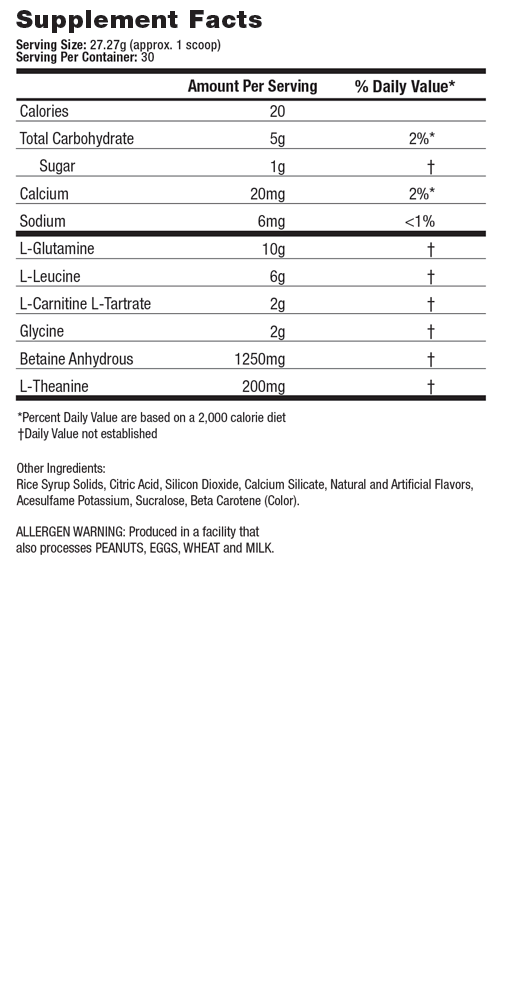
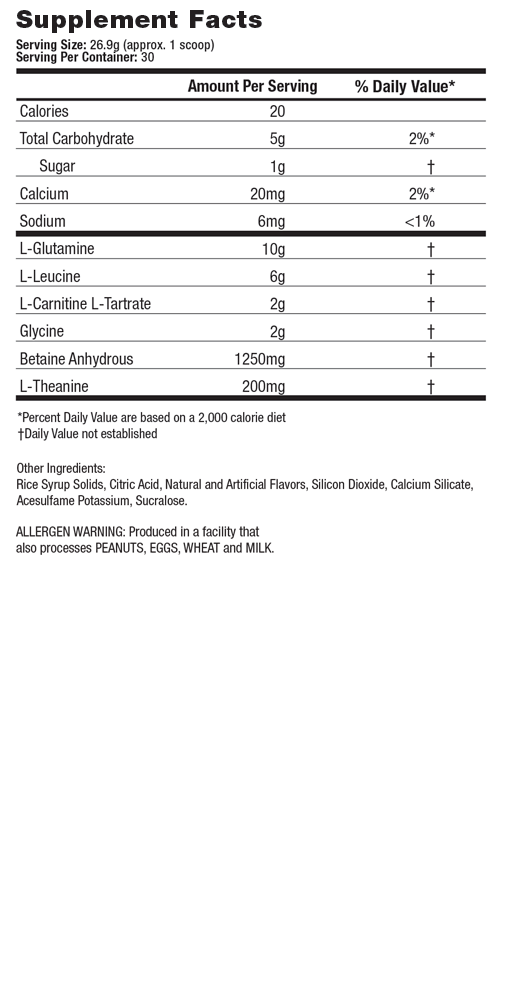
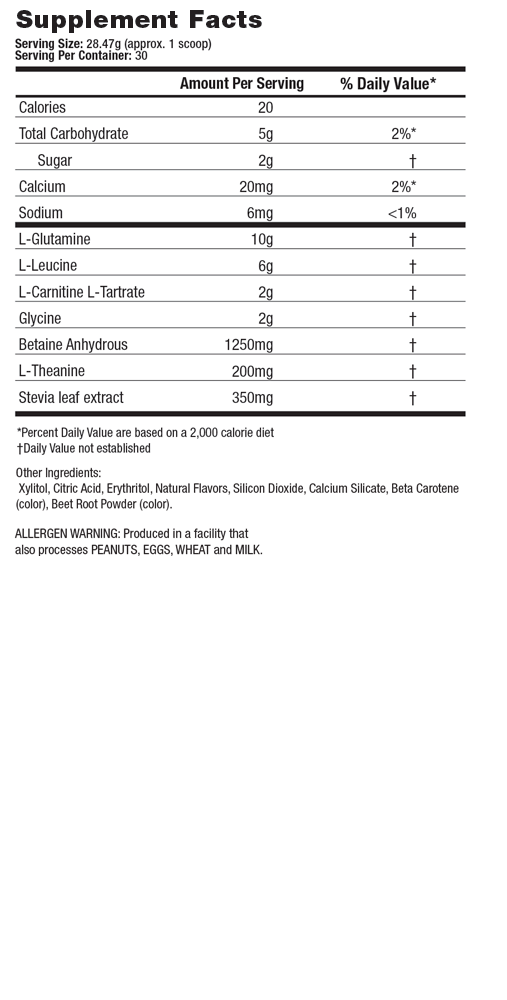
THE POWER
Branch Chained Amino Acids (BCAAs) have been a go–to supplement for athletes and serious trainees for quite some time. Comprised of three of the eight essential amino acids: leucine, isoleucine, and valine AALPHA features that crucial 2:1:1 ratio that’s been proven to deliver results.
No longer just for bodybuilders, research shows that the three amino acids found in AALPHA are the most important in building lean muscle tissue. They’re a crucial supplement for anyone looking to build muscle while staying lean or even more importantly while trying to get lean.
THE SCIENCE
BCAA supplementation can promote muscle protein synthesis and increase muscle growth over time, particularly when taken consistently during intense training cycles. It can also be used to prevent fatigue during longer duration activities allowing you to maintain the intensity required to yield results.
Supplementing with AALPHA can prevent a serum decline in BCAAs, which occurs during exercise. A decreased concentration in the blood would normally cause a tryptophan influx into the brain, followed by serotonin production resulting in fatigue. This is where BCAA’s come in, out competing the serotonin uptake into the brain resulting in prolonged endurance.
BCAAs are important to ingest on a daily basis, and while some may argue that diet alone can provide sufficient BCAA, serious athletes rely on the convenience of supplementing with BCAA’s to ensure there’s no deficiency. Athletes following rigorous training schedules while maintaining or striving for a low body fat are highly encouraged to supplement with BCAA’s.
THE FACTS
Immunity
Intense training without a serious dedication to recovery leads to over-training, plateaued gains, and an increased susceptibility to illness. BCAAs can set up a roadblock on this physical road to ruin by increasing the lymphocyte responsiveness necessary to support immune function.
Amino Acid Deficiency
Essential amino acids are called essential because our body needs them and we cannot produce them on our own. While BCAA’s can be gotten through proper nutrition, when athletes are training hard while trying to stay lean the amount of essential amino acids they’re taking in can drop well below the amount needed to sustain the lean muscle gains they’re working towards. This is especially true when athletes are dieting down for competition, cutting weight or just trying to get their abs to show. When calories get restricted it’s crucial to stay out of that catabolic state. BCAA’s have been shown to be especially helpful in those situations by helping trainees not only hold on to the muscle mass they have but also assisting in building lean muscle.
THE RESULTS
Anyone who knows me knows that I like to stay lean. I started upping my intake of RX3 during a particular busy travel schedule. I noticed that I was starting to see better gains in size during that period. That lead me to look into the specific ingredients. The amount of BCAA’s that I was taking get these results would have yielded an unpalatable taste so I decided to put them into pill form. The best schedule for taking the BCAA’s is 1 serving twice a day before and after training.
ATHLEAN RX AALPHA
PER DAILY SERVING OF AALPHA: 4g
CLINICAL STUDIES
Declining leucine levels signal mTOR that there's a lack of dietary protein present to synthesize new skeletal muscle protein, therefore disabling mTOR. Upon ingesting increased concentrations of leucine, the elevated amino acid then signals mTOR that sufficient dietary protein exists, and switches on overall protein synthesis. An increase in mTOR activity results in an increase in protein-building and more growth!
- Maximizes protein synthesis
- Prevents protein oxidation
PER DAILY SERVING OF AALPHA: 2g
CLINICAL STUDIES
Isoleucine can be seen as the BCAA which mediates glucose uptake (into a cell) and breakdown (into energy) to a larger degree than other amino acids and may serve a role as a hypoglycemic (in diabetics) or as a performance enhancer (if taken preworkout in a carbohydrate replete state).
PER DAILY SERVING OF AALPHA: 2g
CLINICAL STUDIES
Valine helps prevent the breakdown of muscle by supplying the muscles with extra glucose for energy production during intense physical activity. Valine also helps remove potentially toxic excess nitrogen from the liver, and is able to transport nitrogen to other tissues in the body as needed. Valine may help treat liver and gallbladder disease, as well as damage to these organs caused by alcoholism and drug abuse. Valine may help treat or even reverse hepatic encephalopathy, or alcohol-related brain damage.
- Maximizes protein synthesis
- Prevents protein oxidation
PER DAILY SERVING OF AALPHA: 2g
CLINICAL STUDIES
Brand new studies suggest that Taurine is the most abundant amino acid in the body (above glutamine), particularly in the power generating type II fibers. Through supplementation it is possible to maintain peak stores of this important nutrient to enable more consistent force production without energy dropoff. Long term, taurine has been shown to be a cell volumizer that boosts internal muscle hydration…resulting in higher rates of muscle growth and function.
- Supports greater muscle growth and function
- Helps support cardiovascular function
- Helps temporarily restore mental alertness
- Assists in periods of increased mental and physical exertion
REFERENCES
BCAA's (L-Leucine, L-Isoleucine, L-Valine)
-
Amino acid mixture improves training efficiency in athletes M Ohtani, M Sugita, K Maruyama - The Journal of nutrition, 2006 - Am Soc Nutrition
-
Juhn, M. Popular Sports Supplements and Ergogenic Aids. 2003.
-
Manninen, A. Hyperinsulinaemia, hyperaminoacidaemia and post-exercise muscle anabolism: the search for the optimal recovery drink. 2006. Mero, A. Leucine Supplementation and Intensive Training. 1999.
-
Schwenk, T. When Food Becomes A Drug: Nonanabolic Nutritional Supplement Use in Athletes. 2003.
-
Bassit, R. Branched-chain amino acid supplementation and the immune response of long-distance athletes. 2002.
-
Blomstrand, E. Branched-chain amino acids activate key enzymes in protein synthesis after physical exercise. 2006.
-
Crowe, M. Effects of dietary leucine supplementation on exercise performance. 2006.
-
Layman, D. The Role of Leucine in Weight Loss Diets and Glucose Homeostasis. 2003.
-
Norton, L. Leucine regulates translation initiation of protein synthesis in skeletal muscle after exercise. 2006.
-
Meeusen, R. Central FatigueThe Serotonin Hypothesis and Beyond. 2006.
-
Shimomura, Y. Exercise promotes BCAA catabolism: effects of BCAA supplementation on skeletal muscle during exercise. 2004.
-
12. Amino acid supplements and recovery from high-intensity resistance training
-
CPM Sharp, DR Pearson - The Journal of Strength & Conditioning …, 2010 - journals.lww.com
-
13. The effects of amino acid supplementation on hormonal responses to resistance training overreaching
-
WJ Kraemer, NA Ratamess, JS Volek, K Häkkinen… - Metabolism, 2006 - Elsevier
-
14. The effects of amino acid supplementation on muscular performance during resistance training overreaching.
-
NA Ratamess, WJ Kraemer, JS Volek… - The Journal of …, 2003 - journals.lww.com
Taurine
-
Azuma J, Takahisa K, Awata N, Ohta H, Hamaguchi H, Harada H, Takihara K, Hasegawa H, Yamagami R, Ishiyama T, Iwata H, Kishimoto S (1985) Therapeutic effect of taurine in congestive heart failure: a double-blind crossover trial. Clin Cardiol 8: 276–282
-
Baba A, Lee E, Tatsuno T, Iwata H (1982) Cysteine sulfinic acid in the central nervous system: antagonistic effect of taurine on cysteine sulfinic acid-stimulated formation of cyclic AMP in guinea pig hippocampal slices. J Neurochem 38: 1280–1285
-
Bousquet P, Feldman J, Bloch R, Schwartz J (1981) Tag antagonises the central cardiovascular effects of taurine. J Pharmacol Exp Ther 219: 213–218
-
Chazov EI, Malchikova LS, Lipiva NV, Asafov GB, Smirnov VN (1974) Taurine and electrical activity of the heart. Circ Res 35: 11–21
-
Costill DL, Palsky GP, Fink WJ (1978) Effects of caffeine ingestion on metabolism and exercise performance. Med Sci Sports 10: 155
-
Franconi F, Stendardi MI, Failli P, Antonini G, Bennardini F, Matucci R, Manzini S, Giotti A (1983) Taurine antagonizes the alpha-adrenergic positive inotropic effect of phenylephrine. In:
-
Kuriyama K, Huxtable RJ, Iwata H (eds) Sulfur amino acids: Biochemical and clinical aspects: 51–60
-
Geiß K-R, Jester I, Askali F, Förster H, Hamm M, Böhmer D (1993) Auswirkungen fruktose- und glukosehaltiger Getränke auf die körperliche Leistungsfähigkeit bei 9 Triathleten. Dtsch Sportärztekongreß Paderborn (publication in preparation) Geiß K-R, Nöcker J, Waag K-L, Queeney D (1991) Individual calorie calculation and sportspecific nutrient distribution in 100 high-performance athletes to increase performance. Int J Sports Med 12: 122
-
Huxtable RJ, Bressler R (1973) Effect of taurine on a muscle intracellular membrane. Biochim Biophys Acta 323: 573–583 Huxtable RJ (1992) Physiological actions of taurine. Physiological Rev 72 1: 128
-
IBL (1993) Radioimmunoassays zur quantitativen Bestimmung der Katecholamine Noradrenalin und Adrenalin in Plasma und Urin. dbm bulletin: 1–20
-
Inoue A, Takahashi H, Lee L, Iyoda I, Sasaki S, Ijichi H (1985) Centrally induced vasodepressor and sympathetic nerve responses to taurine. Jpn Circ J 49: 1180–1184
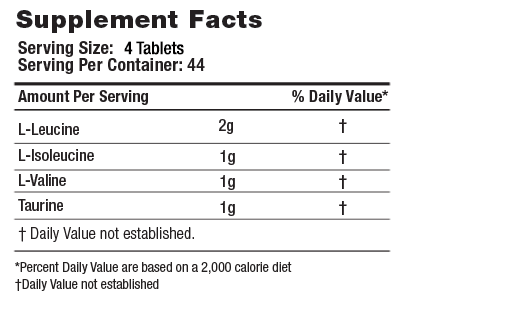



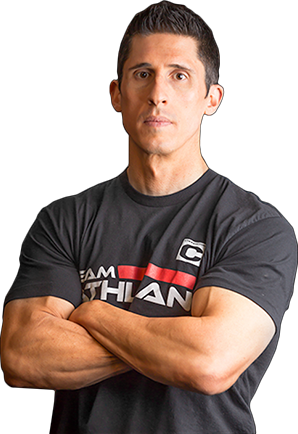
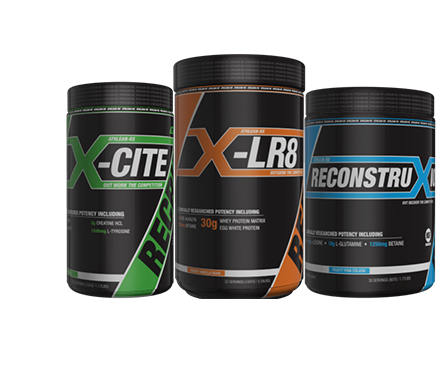
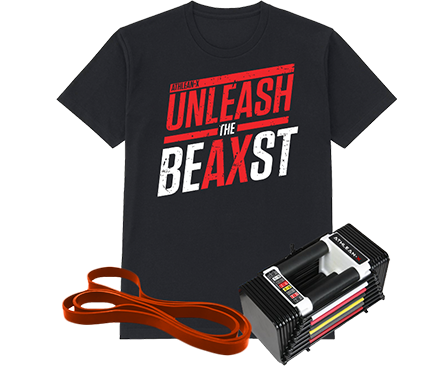







 INDICATES SWEETENED WITH STEVIA
INDICATES SWEETENED WITH STEVIA